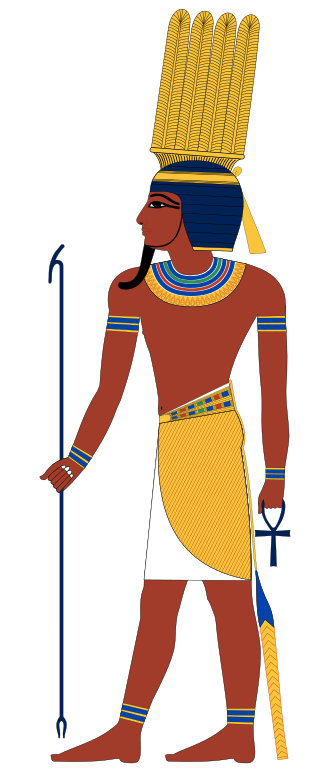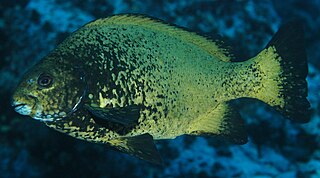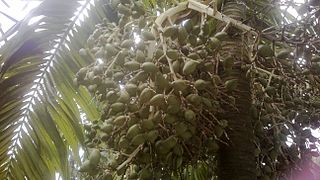
In early Egyptian mythology, Anhur was a god of war who was worshipped in the Egyptian area of Abydos, and particularly in Thinis. Myths told that he had brought his wife, Mehit, who was his female counterpart, from Nubia, and his name reflects this—it means (one who) leads back the distant one.

Holzmaden is a town in Baden-Württemberg, Germany that lies between Stuttgart and Ulm. Holzmaden is 4 km south-east from Kirchheim unter Teck and 19 km south-east of Esslingen am Neckar. The A 8 runs south from Holzmaden. The town and surrounding area are well known as the source of exceptionally well-preserved fossils from the Jurassic period.

Drymophloeus is a genus of flowering plant in the family Arecaceae. It is native to New Guinea and nearby islands in Samoa and Maluku.

Percoidei is one of 3 suborders of bony fishes in the order Perciformes. Many commercially harvested fish species are considered to be contained in this suborder, including the snappers, groupers, basses, goatfishes and perches.

Ptychococcus is a monoecious genus of flowering plant in the palm family from New Guinea and the Solomon Islands. They are closely related to Ptychosperma, only differentiated by the seed shape and endocarp type. The name is a combination of the Greek for "fold" and the Latin for "berry".

Gymnopilus lepidotus is a species of mushroom-forming fungus in the family Hymenogastraceae.

Lactarius lilacinus, the lilac milkcap, is a European species of the large milk-cap genus Lactarius in the order Russulales.
Veitchia lepidota is a plant species endemic to the Solomon Islands in the Pacific Ocean.
Mimasyngenes is a genus of longhorn beetles of the subfamily Lamiinae, containing the following species:
Mimasyngenes icuapara is a species of beetle in the family Cerambycidae. It was described by Galileo and Martins in 1996. It is known from Argentina and Brazil.
Mimasyngenes lucianae is a species of beetle in the family Cerambycidae. It was described by Galileo and Martins in 2003. It is known from Brazil.
Mimasyngenes quiuira is a species of beetle in the family Cerambycidae. It was described by Galileo and Martins in 1996. It is known from Brazil.
Mimasyngenes ytu is a species of beetle in the family Cerambycidae. It was described by Galileo and Martins in 1996. It is known from Brazil.
Mimasyngenes murutinga is a species of beetle in the family Cerambycidae. It was described by Martins and Galileo in 2006. It is known from western Ecuador.
Mimasyngenes inlineatus is a species of beetle in the family Cerambycidae. It was described by Stephan von Breuning in 1956. It is known from Colombia and Venezuela.
Mimasyngenes lineatipennis is a species of beetle in the family Cerambycidae. It was described by Stephan von Breuning in 1950. This species can be found in Argentina and Brazil.
Mimasyngenes venezuelensis is a species of beetle in the family Cerambycidae. It was described by Stephan von Breuning in 1956. It is known from Venezuela.
Mimasyngenes multisetosus is a species of beetle in the family Cerambycidae. It was described by Clarke in 2007. It is known from Bolivia.

Epicaerus lepidotus is a species of broad-nosed weevil in the beetle family Curculionidae. It is found in North America.

Andesanthus lepidotus, synonym Tibouchina lepidota, also known as alstonville, Andean princess flower, lasiandra, or glory bush, is a medium-sized ornamental tree or a large shrub native to northwestern South America that is cultivated for its masses of purple flowers from autumn right through to winter.








